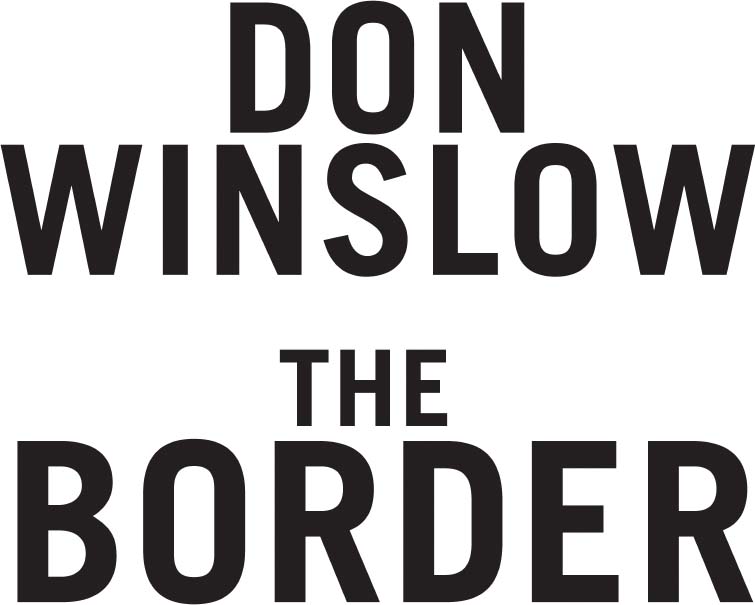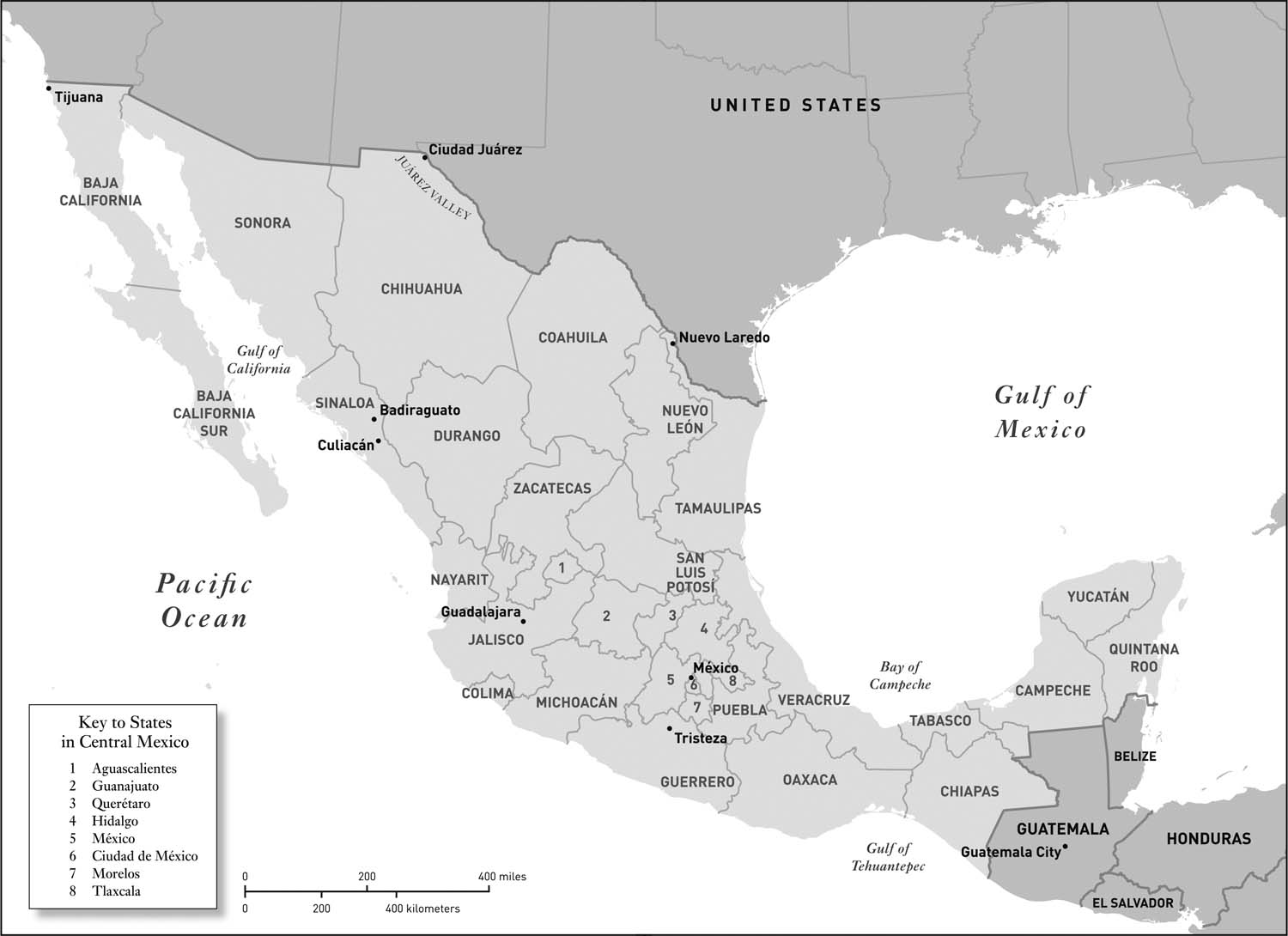
Полная версия:
The Border: The final gripping thriller in the bestselling Cartel trilogy



Copyright
This is entirely a work of fiction. Any references to real people, living or dead, real events, businesses, organizations and localities are intended only to give the fiction a sense of reality and authenticity. All names, characters and incidents are either the product of the author’s imagination or are used fictitiously, and their resemblance, if any, to real-life counterparts is entirely coincidental.
HarperCollinsPublishers
1 London Bridge Street
London SE1 9GF
www.harpercollins.co.uk
First published in Great Britain by HarperCollinsPublishers 2019
First published in the United States by William Morrow, an imprint of HarperCollinsPublishers 2019
Copyright © Samburu, Inc 2019
Stephen King, excerpt from Introduction to The Shining (New York: Pocket Books, 2001). Copyright © 2001 by Stephen King. Reprinted by permission.
Tom Russell, excerpt from “Leaving El Paso” (Frontera Music / BMG Firefly). Reprinted by permission. All rights reserved.
Don Winslow asserts the moral right to be identified as the author of this work
Cover design by Claire Ward © HarperCollinsPublishers Ltd 2019
Cover photographs © Ted Wood / plainpicture / Aurora Photos (landscape); Shutterstock.com (sky).
A catalogue record for this book is available from the British Library
All rights reserved under International and Pan-American Copyright Conventions. By payment of the required fees, you have been granted the non-exclusive, non-transferable right to access and read the text of this e-book on-screen. No part of this text may be reproduced, transmitted, down-loaded, decompiled, reverse engineered, or stored in or introduced into any information storage and retrieval system, in any form or by any means, whether electronic or mechanical, now known or hereinafter invented, without the express written permission of HarperCollins e-books
Ebook Edition © February 2019 © ISBN: 9780008227555
Version: 2019-03-06
Dedication
In memory of
Abel García Hernández, Abelardo Vázquez Peniten, Adán Abraján de la Cruz, Alexander Mora Venancio, Antonio Santana Maestro, Benjamín Ascencio Bautista, Bernardo Flores Alcaraz, Carlos Iván Ramírez Villarreal, Carlos Lorenzo Hernández Muñoz, César Manuel González Hernández, Christian Alfonso Rodríguez Telumbre, Christian Tomás Colón Garnica, Cutberto Ortiz Ramos, Doriam González Parral, Emiliano Alen Gaspar de la Cruz, Everardo Rodríguez Bello, Felipe Arnulfo Rosa, Giovanni Galindes Guerrero, Israel Caballero Sánchez, Israel Jacinto Lugardo, Jesús Jovany Rodríguez Tlatempa, Jhosivani Guerrero de la Cruz, Jonás Trujillo González, Jorge Álvarez Nava, Jorge Aníbal Cruz Mendoza, Jorge Antonio Tizapa Legideño, Jorge Luis González Parral, José Ángel Campos Cantor, José Ángel Navarrete González, José Eduardo Bartolo Tlatempa, José Luis Luna Torres, Julio César López Patolzín, Leonel Castro Abarca, Luis Ángel Abarca Carrillo, Luis Ángel Francisco Arzola, Magdaleno Rubén Lauro Villegas, Marcial Pablo Baranda, Marco Antonio Gómez Molina, Martín Getsemany Sánchez García, Mauricio Ortega Valerio, Miguel Ángel Hernández Martínez, Miguel Ángel Mendoza Zacarías, Saúl Bruno García, Daniel Solís Gallardo, Julio César Ramírez Nava, Julio César Mondragón Fontes and Aldo Gutiérrez Solano.
And dedicated to
Javier Valdez Cárdenas
and all journalists everywhere.
Epigraph
And when anyone builds a wall, behold, they plaster it over with whitewash; so tell those who plaster it over with whitewash, that it will fall.
—Ezekiel 13:10
Contents
Cover
Title Page
Copyright
Dedication
Epigraph
Map
Prologue
Book One: Memorial
1. Monsters and Ghosts
2. The Death of Kings
3. Malevolent Clowns
Book Two: Heroin
1. The Acela
2. Heroin Island
3. Victimville
4. The Bus
Book Three: Los Retornados
1. The Holidays
2. Coyotes
3. La Bestia
4. This Upside-Down World
5. Banking
Book Four: Inauguration
1. Foreign Lands
2. Death Will Be the Proof
3. Bad Hombres
4. Billy the Kid
5. White Christmas
Book Five: Truth
1. The Most Powerful Entity on Earth
2. Broken
3. Cheap Guns
4. The Reflecting Pool
Epilogue
Acknowledgments
Keep Reading …
About the Author
Also by Don Winslow
About the Publisher
Map

Prologue
Washington, DC
April 2017
Keller sees the child and the glint of the scope in the same moment.
The little boy, holding his mother’s hand, gazes at the names etched into the black stone, and Keller wonders if he’s looking for someone—a grandfather, maybe, or an uncle—or if his mother just brought her son to the Vietnam Veterans Memorial as the end of a walk down the National Mall.
The Wall sits low in the park, hidden like a guilty secret, a private shame. Here and there, mourners have left flowers, or cigarettes, even small bottles of booze. Vietnam was a long time ago, another lifetime, and he’s fought his own long war since then.
No battles are inscribed on the Vietnam Wall. No Khe Sanhs or Quảng Trịs or Hamburger Hills. Maybe because we won every battle but lost the war, Keller thinks. All these deaths for a futile war. On previous trips, he’d seen men lean against the Wall and sob like children.
The sense of loss heartbreaking and overwhelming.
There are maybe forty people here today. Some of them look like they might be vets, others families; most are probably tourists. Two older men in VFW uniforms and caps are there to help people locate their loved ones’ names.
Now Keller is at war again—against his own DEA, the US Senate, the Mexican drug cartels, even the president of the United States.
And they’re the same thing, the same entity.
Every border Keller once thought existed has been crossed.
Some of them want to silence him, put him in prison, destroy him; a few, he suspects, want to kill him.
Keller knows that he’s become a polarizing figure, embodying the rift that threatens to widen and tear the country in two. He’s triggered a scandal, an investigation that’s spread from the poppy fields of Mexico to Wall Street to the White House itself.
It’s a warm spring day, a little breezy, and cherry blossoms float in the air. Sensing his emotion, Marisol takes his hand.
Now Keller sees the boy and then—to the right, back toward the Washington Monument—the odd, random glint of light. Lunging for the mother and the child, Keller shoves them to the ground.
Then he turns to shield Mari.
The bullet spins Keller like a top.
Creases his skull and whips his neck around.
Blood pours into his eyes and he literally sees red as he reaches out and pulls Marisol down.
Her cane clatters on the walkway.
Keller covers her body with his.
More bullets smack into the Wall above him.
He hears shouts and screams. Someone yells, “Active shooter!”
Peering up, Keller looks for the origin of the shots and sees that they’re coming from the southeast, from about ten o’clock—from behind a small building he remembers is a restroom. He feels for the Sig Sauer at his hip but then remembers that he’s unarmed.
The shooter flips to automatic.
Bullets spray the stone above Keller, chipping away names. People lie flat or crouch against the Wall. A few near the lower edges scramble over and run toward Constitution Avenue. Others just stand, bewildered.
Keller yells, “Down! Shooter! Down!”
But he sees that’s not going to help and that the memorial is now a death trap. The Wall forms a wide V and there are only two ways out along a narrow path. A middle-aged couple run to the east exit, toward the shooter, and are hit right away, dropping like characters in some hideous video game.
“Mari,” Keller says, “we have to move. Do you understand?”
“Yes.”
“Be ready.”
He waits until there’s a pause in the fire—the shooter changing clips—then gets up, grabs Mari and hefts her over his shoulder. He carries her along the Wall to the west exit, where the Wall slopes down to waist level, tosses her up and over and sets her down behind a tree.
“Stay down!” he yells. “Stay there!”
“Where are you going?!”
The shooting starts again.
Jumping back over the Wall, Keller starts to herd people toward the southwest exit. He puts one hand on the back of a woman’s neck, pushes her head down and moves her along, yelling, “This way! This way!” But then he hears the sharp hiss of a bullet and the solid thunk as it hits her. She staggers and drops to her knees, clutching at her arm as blood pours through her fingers.
Keller tries to lift her.
A round whizzes past his face.
A young man runs up to him and reaches for the woman. “I’m a paramedic!” Keller hands her across, turns back and keeps shoving people ahead of him, away from the gunfire. He sees the boy again, still clutching his mother’s hand, his eyes wide with fear as his mother pushes him ahead of her, trying to screen him with her body.
Keller wraps an arm around her shoulder and bends her down as he keeps her moving. He says, “I’ve got you. I’ve got you. Keep walking.” He sees her to safety at the far end of the Wall and then goes back again.
Another pause in the firing as the shooter changes clips again.
Christ, Keller thinks, how many can he have?
At least one more, because the firing starts again.
People stumble and fall.
Sirens shriek and howl; helicopter rotors throb in deep, vibrating bass.
Keller grabs a man to pull him forward but a bullet hits the man high in the back and he falls at Keller’s feet.
Most people have made it out the west exit, others lie sprawled along the walkway, and still others lie on the grass where they tried to run the wrong way.
A dropped water bottle gurgles out on the walkway.
A cell phone, its glass cracked, rings on the ground next to a souvenir—a small, cheap bust of Lincoln—its face splattered with blood.
Keller looks east and sees a National Park Service policeman, his pistol drawn, charge toward the restroom building and then go down as bullets stitch across his chest.
Dropping to the ground, Keller snake-crawls toward the cop and feels for a pulse in his neck. The man is dead. Keller flattens behind the body as rounds smack into it. He looks up and thinks he spots the shooter, crouched behind the restroom building as he loads another clip.
Art Keller has spent most of his life fighting a war on the other side of the border, and now he’s home.
The war has come with him.
Keller takes the policeman’s sidearm—a 9 mm Glock—and moves through the trees toward the shooter.

Memorial
Only the dead have seen the end of war.
—Plato
1
Monsters and Ghosts
Monsters are real, and ghosts are real, too. They live inside us, and sometimes, they win.
—Stephen King
November 1, 2012
Art Keller walks out of the Guatemalan jungle like a refugee.
He left a scene of slaughter behind him. In the little village of Dos Erres, bodies lie in heaps, some half burned in the smoldering remnants of the bonfire into which they’d been tossed, others in the village clearing where they’d been gunned down.
Most of the dead are narcos, gunmen from rival cartels that came here allegedly to make peace. They had negotiated a treaty, but at the debauched party to celebrate their reconciliation, the Zetas pulled out guns, knives and machetes and set to butchering the Sinaloans.
Keller had literally fallen onto the scene—the helicopter he’d been in was hit by a rocket and spun to a hard landing in the middle of the firefight. He was hardly an innocent, having planned with the Sinaloa boss, Adán Barrera, to come in with a team of mercenaries and eliminate the Zetas.
Barrera had set up his enemies.
The problem was, they set him up first.
But the two main targets of Keller’s mission, the Zeta leaders, are dead—one decapitated, the other turned into a flaming torch. Then, as they’d agreed in their uneasy, evil truce, Keller had gone off into the jungle to find Barrera and bring him out.
It seemed to Keller that he’d spent his whole adult life going after Adán Barrera.
After twenty years of trying, he’d finally put Barrera in a US prison, only to see him transferred back to a Mexican maximum-security facility from which he promptly “escaped” and then made himself more powerful than ever, the godfather of the Sinaloa cartel.
So Keller went back down to Mexico to go after Barrera again, only to become, after eight years, his ally, joining with him to bring down the Zetas.
The greater of two evils.
Which they did.
But Barrera disappeared.
So now Keller walks.
A handful of pesos to the border guard gets him into Mexico and then he hikes the ten miles to the Campeche village from which the raid had been staged.
More like he staggers.
The adrenaline from the gunfight that started before dawn has dropped, and now he feels the sun and the close heat of the rain forest. His legs ache, his eyes hurt, the stench of flame, smoke and death sticks in his nose.
The smell of burning flesh never leaves you.
Orduña waits for him at the little airstrip hacked out of the forest. The commander of FES sits inside the bay of a Black Hawk helicopter. Keller and Admiral Orduña had formed an “anything you need, anytime” relationship during their war against the Zetas. Keller provided him with top-level American intelligence and often accompanied his elite special-forces marines on operations inside Mexico.
This one had been different—the chance to decapitate the Zeta leadership in a single stroke came in Guatemala, where the Mexican marines couldn’t go. But Orduña provided Keller’s team with a staging base and logistical support, flew the team into Campeche, and now waits to see if his friend Art Keller is still alive.
Orduña smiles broadly when he sees Keller walk out of the tree line, then reaches into a cooler and hands Keller a cold Modelo.
“The rest of the team?” Keller asks.
“We flew them out already,” Orduña says. “They should be in El Paso by now.”
“Casualties?”
“One KIA,” Orduña says. “Four wounded. I wasn’t so sure about you. If you didn’t come in by nightfall, a la mierda todo, we were going over to get you.”
“I was looking for Barrera,” Keller says, sluicing down the beer.
“And?”
“I didn’t find him,” Keller says.
“What about Ochoa?”
Orduña hates the Zeta leader almost as much as Keller hates Adán Barrera. The war on drugs tends to get very personal. It had gotten personal for Orduña when one of his officers was killed on a raid against the Zetas, and they came in and murdered the young officer’s mother, aunt, sister and brother the night of his funeral. He had formed the Matazetas—“Zeta Killers”—the morning after that. And kill Zetas they did, every chance they got. If they took prisoners, it was only to get information, and then they executed them.
Keller had different reasons to hate the Zetas.
Different, but sufficient.
“Ochoa’s dead,” Keller says.
“Confirmed?”
“I saw it,” Keller says. He’d watched Eddie Ruiz pour a can of paraffin all over the wounded Zeta boss and then toss a match on him. Ochoa died screaming. “Forty, too.”
Forty was Ochoa’s number-two man. A sadist like his boss.
“You saw his body?” Orduña asks.
“I saw his head,” Keller says. “It wasn’t attached to his body. That good enough for you?”
“It’ll do,” Orduña says, smiling.
Actually, Keller didn’t see Forty’s head. What he saw was Forty’s face, which someone had peeled off and sewn to a soccer ball.
“Has Ruiz shown up?” Keller asks.
“Not yet,” Orduña says.
“He was alive the last time I saw him,” Keller says.
Turning Ochoa into a highway flare. Then standing on some old Mayan stone courtyard watching a kid kick a very bizarre soccer ball around.
“Maybe he just took off,” Orduña says.
“Maybe.”
“We should get in touch with your people. They’ve been calling about every fifteen minutes.” Orduña punches some numbers into a burn phone and then says, “Taylor? Guess who I have here.”
Keller takes the phone and hears Tim Taylor, the DEA chief of the Southwest District, say, “Jesus Christ, we thought you were dead.”
“Sorry to disappoint you.”
They’re waiting for him at the Adobe Inn in Clint, Texas, on a remote highway a few miles east of El Paso.
The room is your standard motel “efficiency,” a large living room with a kitchen area—microwave, coffee maker, small refrigerator—a sofa with a coffee table, a couple of chairs and a television set. A bad painting of a sunset behind a cactus. A door at the left, open now, leads into a bedroom and bathroom. It’s a good, nondescript place to hold their debrief.
The television is on low, tuned to CNN.
Tim Taylor sits on the sofa, looking at a laptop computer set on the coffee table. A satphone stands upright by the computer.
John Downey, the military commander of the raid, stands by the microwave, waiting for something to heat. He’s out of cammies, Keller sees, showered and shaved, wearing a plum polo shirt over jeans and tennis shoes.
Another man, a CIA guy Keller knows as Rollins, sits in one of the chairs and watches the television.
Downey looks up when Keller comes in. “Where the fuck have you been, Art? We’ve done satellite runs, helicopter searches …”
Keller was supposed to have brought Barrera out safely. That was the deal. Keller asks, “How are your people?”
“Phwoom.” Downey makes a gesture with his hands, like a flushed covey of quail. Keller knows that within twelve hours the spec-ops will be scattered all over the country, if not the world, with cover stories about where they’ve been. “The only unaccounted for is Ruiz. I was hoping he came out with you.”
“I saw him after the firefight,” Keller says. “He was walking out.”
“So Ruiz is in the wind?” Rollins asks.
“You don’t have to worry about him,” Keller says.
“He’s your responsibility,” Rollins says.
“Fuck Ruiz,” Taylor says. “What happened to Barrera?”
Keller says, “You tell me.”
“We haven’t had any word from him.”
“Then I guess he didn’t make it,” Keller says.
“You refused to get on the ex-fil chopper,” Rollins says.
“The chopper had to take off,” Keller says, “and I still had to find Barrera.”
“But you didn’t find him,” Rollins says.
“Special ops aren’t room service,” Keller answers. “You can’t always get exactly what you order. Things happen.”
Right from the jump.
They’d helicoptered onto a firefight that was already in progress as the Zetas were butchering the Sinaloans. Then a surface-to-air rocket hit the lead chopper that Keller was in, killing one man and wounding another. So instead of going down the ropes, they made a hard landing onto a hot zone. Then they had to shuttle the team out on the surviving chopper.
We were lucky to have gotten out at all, Keller thinks, never mind completing the main mission of executing the leading Zetas. If we didn’t manage to bring Barrera out with us, well …
“The primary mission, as I understood it,” Keller says, “was to take out the Zetas’ command and control. If Barrera was a collateral casualty …”
“All the better?” Rollins asks.
They all know Keller’s hatred of Barrera.
That the drug lord had tortured and murdered Keller’s partner.
That he’d never forget, never mind forgive.
“I won’t shed any crocodile tears for Adán Barrera,” Keller says. He knows the situation in Mexico better than any of the people in that room. Like it or not, the Sinaloa cartel is key to stability in Mexico. If the cartel falls apart because Barrera is gone, the tenuous peace could fall apart with it. Barrera knew that, too—this après moi, le déluge attitude allowed him to drive a tough bargain with both the Mexican and American governments to lay off him and attack his enemies.
The microwave bings and Downey takes out the tray. “Stouffer’s lasagna. A classic.”
“We don’t even know Barrera’s dead,” Keller says. “Have they found a body?”
“No,” Taylor says.
“D-2 is on the scene now,” Rollins says, referring to the Guatemalan paramilitary intelligence agency. “They haven’t found Barrera. Or either of the primary targets, for that matter.”
“I can personally confirm that both targets were terminated,” Keller says. “Ochoa is basically charcoal, and Forty … well, you don’t want to know about Forty. I’m telling you, they’re both past tense.”
“We’d better hope Barrera isn’t,” Rollins says. “If the Sinaloa cartel is unstable, Mexico is unstable.”
“The law of unintended consequences,” Keller says.
Rollins says, “We had a very specific agreement with the Mexican government to preserve Adán Barrera’s life. We guaranteed his safety. This isn’t Vietnam, Keller. It isn’t Phoenix. If we find out that you violated that agreement, we’ll—”
Keller stands up. “You’ll do exactly shit. Because that was an unauthorized, illegal operation that ‘never happened.’ What are you going to do? Take me to trial? Put me on the witness stand? Let me testify under oath that we had a deal with the world’s biggest drug dealer? That I went on a US-sponsored raid to eliminate his rivals? Let me tell you something that those of us who do the actual work know—never draw your weapon unless you’re prepared to pull the trigger. Are you prepared to pull the trigger?”



